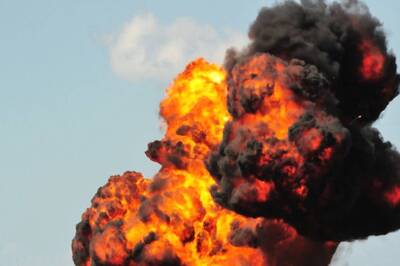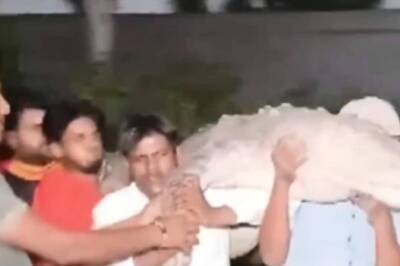
views
As campaigning for the last leg of electoral battle for 13 seats in eastern UP gathers pace, atrocities committed on women has suddenly become the tool for political attacks and counter attacks.
But the debate, for both BJP and the SP-BSP gathbandhan, is less about the law and order situation and more about managing caste calculations on the ground.
If before 2017 UP assembly elections, “bahu beti ki izzat” was more about the larger Hindu consolidation for the BJP against alleged “minority dominance” in western UP after Muzaffarnagar riots were allegedly sparked by a case of sexual harassment, in 2019, it’s the gang rape of a Dalit woman in Alwar district of Rajasthan that is being used for caste-based mobilisation by the BJP and the opposition alliance.
Although the gang rape case is of Rajasthan, Prime Minister Narendra Modi decided to demand answers from BSP president Mayawati in Uttar Pradesh. And Mayawati, who is so keenly focused on her electoral campaign in UP, also took out time to accuse the Congress government in Rajasthan of trying to hush up the case.
If it’s not concern over crime against women that prompted the two to bring the issue into mainstream political discourse, was it larger political concerns instead?
The answer lies in the electoral political realities of eastern UP. Like the 14 seats of Phase 6, polling for which was held on May 12, the remaining 13 seats going to poll on May 19 can also be electorally defined by the large sections of lesser prominent backward and dalit castes.
These are those most backward and non-Jatav Dalit castes who may not dominate any particular seat on their own but collectively form a large voting bloc.
Unlike in west and central UP region where either the Chamars among the Dalits or else Yadavs or Jats among the OBC’s singularly dominate the specific region, eastern UP is more about complexities of demographic realities.
Constituencies going to polls in the last leg also include Prime Minister Modi’s own Varanasi and the prestige seat of Gorakhpur.
Gorakhpur is the most defining example of the importance of these numerically small but collectively significant most backward and Dalit castes.
One of the strongest citadels for BJP and UP chief minister Yogi Adityanath, the party lost the seat to the SP-BSP gathbandhan in 2018 bypolls. This embarrassing defeat came primarily because of a much smaller player, the Nishad Party.
The SP-BSP had taken the small MBC identity-based political outfit on board and fielded its leader Praveen Nishad as a candidate in Gorakhpur.
Nishad, kahars, Mallahs and Kashyaps - the different sub-castes among the most backward – despite being individually of no dominance together constitute around 19 percent of voters in the Gorakhpur constituency.
Yadavs, one of the core constituents of SP-BSP alliance, are only around 6.5 per cent. Similarly, another core voting group for the alliance - Dalit Chamars – are only around half of the total 17 % dalit voters here.
Naturally, elections in Gorakhpur will, therefore, be defined more by the non-Yadav backwards and non-Jatav/chamar Dalit castes. It was because of a significant dent in this section of voters that the alliance was able to turn the tables against the BJP in the by-elections.
Praveen Nishad got 4.56 lakh votes and defeated BJP by a narrow margin of around 20 thousand votes. In terms of votes polled, it was alliance’s 48.87 per cent against BJP’’s 46.53
Like Gorakhpur, these smaller backward and dalit castes are also in position to tilt the scales on other seats going to polls on May 19. These constituencies are Maharajganj, Kushinagar, Deoria, Ghosi, Salempur, Balia, Gazipur, Chandauli, Mirzapur, Bansgaon and Robertsganj. The last are reserved constituencies.
While in Varanasi, there may not be a major challenge for Prime Minister, elsewhere it’s huge challenge for the BJP. Like the constituencies of Phase 6, SP-BSP as a combined force look slightly better placed than BJP on several of the seats in Phase 7.
Naturally, in a tough electoral battle scenario, the saffron party will hope for a maximum counter polarization of the non-Yadav and non jatav backward and Dalit castes against the gathbandhan.
It’s because of the decisive nature of the several most backward and dalit castes in the region that an all-out, caste-based political diatribe has broken out between Prime Minister Modi and BSP president Maywati. It started with Mayawati accusing Modi of being a “fake OBC”, to which the PM replied that he was from the “most backward caste”.
Addressing a rally in East UP, the PM recently said, “For me it’s also the poverty which is the defining caste. I have seen poverty from close quarters, have lived it and it’s because of these poverty struck castes that I have got an opportunity to serve the country”.
But the frantic efforts to address the necessary caste equations didn’t stop there. Responding to Mayawati’s attack against the Congress over alleged cover up of the Alwar gang rape by Rajasthan government, PM Modi in his rally in Kushi Nagar on Sunday, in very strong words questioned Mayawati’s love and concern for Dalit girls.
Giving it a larger political spin, the Prime Minister asked, “Why is Mayawati ji just shedding crocodile tears on the gang rape of Dalit girls, why has she not withdrawn support from the Congress government of Rajasthan?”
On Monday, Mayawati showed no restraint as she hit back and dragged the PM’s wife into the slugfest. “Prime Minister Modi has no real concern for either Dalits or women. Why he didn’t sack his government and leaders after the infamous Una incident or Rohit Vemula suicide case,” she asked.
She didn’t stop here and further said, “Prime Minister has done injustice to his own wife and many women in BJP fear that their husbands may get influenced by him in behaving the same way with them.”
Dr Seem Rana, a women right’s activist and assistant Professor of History at Lucknow’s Shia PG College said it was unfortunate that issues of violence against women and discrimination are looked through a caste and religion prism.
“If Prime Minister is so concerned about Alwar gang rape case, he should have also shown a similar concern about the Muzzafarpur shelter home rape cases in Bihar and Deoria shelter home rapes of girls in Uttar Pradesh,” she said.



















Comments
0 comment